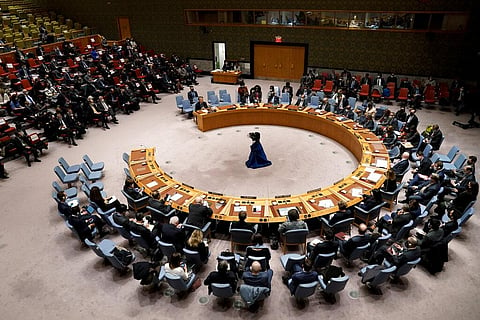

The UN Security Council resolution on the ongoing Ukraine crisis failed due to the Russian veto; if 11 voted in favour, India abstained and was joined by China and the UAE. Going by the Crimean vote in March 2014, India may also abstain when the Ukraine crisis moves to the UNGA. Before the Friday vote in New York, Prime Minister Narendra Modi spoke to Russian President Vladimir Putin while External Affairs Minister S Jaishankar conversed with his counterparts in the US, Russia, Romania, Hungary, Slovakia, the UK and EU; and after the vote, the PM had a brief conversation with beleaguered Ukrainian President Volodymyr Zelenskyy.
If the US was disappointed, Moscow was satisfied with India’s ‘independent and balanced’ position, and many within the country see it as a sign of New Delhi’s diplomatic manoeuvre in the light of scores of citizens trapped in the war zone. While the deteriorating ground situation, mounting civilian casualties and Russian advance deep inside Ukraine are obvious to anyone, how does one read the Indian voting in the UNSC?
Could India have voted YES on the Security Council resolution that ‘deplores’ the Russian military aggression on Ukraine? That was the expectation of the Biden administration, and there are compelling reasons; its support for India vis-a-vis political competition with China, including the ongoing border tensions, both bilaterally and through Quad, growing military supplies and cooperation, support for membership in various international organisations and forums, possible waiver over the Russian supply of S-400 missile defence system, etc. While the American endorsement and backing alone are insufficient for India’s great power aspirations, any progress in that direction would be conditional upon unflinching US support.
Despite these carrots and sticks, voting YES was not sensible. As Ukrainian President Zelenskyy found out during his hour of need, the Biden administration is more interested in his ‘safe exit’ than resistance. After decades of costly and ill-defined wars in Iraq and Afghanistan, the US has no stomach for another round of boots on the ground, especially if it meant a direct confrontation with Russia. Thus, the American credibility in standing up for its friends continues to diminish; the list is long, Taiwan, Shah of Iran, Hosni Mubarak and now Zelenskyy.
Moreover, even a positive Indian vote would not have brought enduring gains in Washington. The Biden administration, especially its liberal wing, will soon revert to its agenda and needle India on a host of domestic human rights issues. Voting YES would have also meant a setback to the New Delhi-Moscow relations with disastrous consequences on many fronts, especially arms trade, Pakistan, and might consolidate Sino-Russian relations. The US has neither the will nor the capacity to compensate for these negative fallouts of a YES vote.
Even without the US factor, Ukraine is less attractive than Russia in terms of trade, energy security, political support, military supplies or power politics. Indeed, whether the USSR or Russia, India has never criticised Moscow’s military aggression against its neighbours and irrespective of the objective facts, New Delhi never spoke against aggression: remember Hungary (1956), Czechoslovakia (1968), Afghanistan (1979) and Crimea (2014)? Indeed when PM Modi played host to President Putin in December 2014, the Russian delegation also included the ‘prime minister’ of Crimea, annexed by Moscow only a few months earlier. Hence, in terms of cost-benefit analysis, YES was neither attractive nor feasible.
Likewise, a NO vote was equally problematic.
Hostilities began after President Putin declared war on Ukraine, and hence it is Russian aggression than a Ukraine crisis. Moreover, the Russian military campaign does not have a UN mandate, something the US used to justify its invasion of Iraq (2003) or Libya (2011). Nor is the situation in Ukraine a crisis that necessitated an external ‘humanitarian intervention’. Instead, it is a blatant case of aggression and not satisfied with the capture and annexation of the Crimea Peninsula in March 2014, Russia has now invaded deep into Ukraine.
If the eastward expansion of NATO is the provocation for the latest confrontation, the intimidatory Russian tactics are the ruse. If NATO coming to its borders is a security threat to Putin, why do so many former Soviet republics and others seek to join the West bloc? Indeed, the Russian annexation of Crimea spurred the Ukrainian revival for NATO membership in February 2019. So it is not surprising that Albania, which joined NATO in 2009, is the co-sponsor of the failed UNSC resolution on Ukraine. Despite its time-tested friendship, India cannot remain indifferent to Russian provocations.
There are some bilateral issues. Though it lacks an effective counter-strategy, India has been uneasy over Putin’s bonhomie with China and his less-than-expected support over border clashes with Beijing. Russia is also lukewarm in finding a place for India in the Afghan process, especially after the return of the Taliban. Thus, even though Ukraine is not critical in its foreign policy calculations, India could not openly embrace the Russian aggression as a NO to the UNSC Resolution would have placed it on the side of aggression and disregard for sovereignty and territorial integrity, its core arguments vis-a-vis China and Pakistan.
Thus, abstention is not ideal and underscores India’s limited space for manoeuvre. Either by design or accident, India is playing great power politics by not taking a firm stand on great power aggression against a weaker state. International relations is more about power and influence and less about morality and ethics. Like WWE, international relations are brutal and ruthless. There is no room for morality, principles, ethics and human rights. In short, India’s message on the Ukraine crisis is that there is less room for ethics and morality in great power politics.
P R Kumaraswamy
Professor, School of International Studies, JNU
(kumaraswamy.pr@gmail.com)